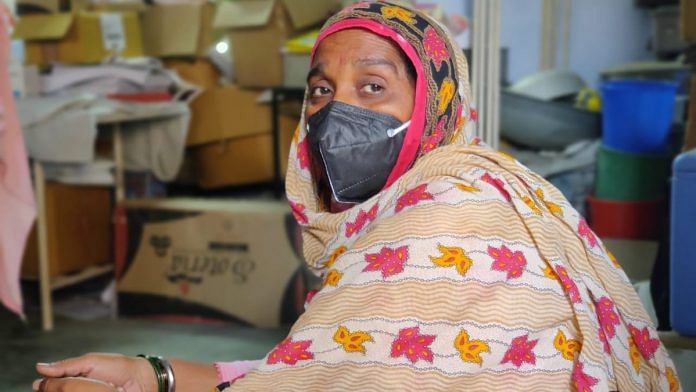Patiala: On 11 May, Karamjeet Kaur, 51, an ASHA worker in Patiala’s Dabhlan village, lost her husband to Covid-19. On 14 May, she was back at work — on the ground, carrying out door-to-door sampling, encouraging people to get vaccinated.
Her children are now bitter towards her, and blame her for “getting home” the virus that took their father away, she told ThePrint. But Kaur, rattled by guilt herself, continues to perform her duty. The reason — she is the only earning member left in the family.
“My kids tell me that I transferred the virus to their father, since I visited Covid positive people every day. They are angry, they are upset and now blame me,” Kaur said.
“I understand their anger, how they feel. I, too, feel guilty about it, but what can I do? I have to be back on the ground if I want my family to survive.”
Kaur earns a meagre amount of Rs 2,500 a month. While her son is pursuing BSc Nursing, one of her daughters is married and the other, aged 22, stays at home. She has completed her schooling but never went to college as Kaur and her husband, Amarjeet Singh, did not have the means to enrol her in one.
“I wonder how I will make ends meet on this meagre salary. How will I ensure that my kids are all educated, settled?” she said.
Also Read: How diet, lifestyle & attitude have led Punjab to record India’s highest Covid death rate
‘I ignored what was happening at my own house’
Kaur is a member of one of 63 rapid response teams working across Patiala that physically track all Covid cases in their respective areas and carry out vaccination drives, under the supervision of medical officers.
It’s a responsibility that keeps her out nearly all day. A month since her husband’s death, Kaur finds herself confronting a deep guilt. She said she was so caught up in the responsibilities attached with her job that she “ignored her husband’s symptoms”.
“My day starts at 8 am, when I go house-to-house to conduct surveys, tell people about the benefits of vaccination. Then I head out for door-to-door sampling of suspected Covid cases and also to administer vaccinations. I return home by evening, and by the time I get done with cooking, it is time to sleep,” she added.
“My husband was sick, but I did not pay much attention, thinking it may be a viral infection. I had a fever too, but I was so busy on the ground, making other people aware of Covid symptoms, tracking pregnant women, that I ignored what was happening inside my own house,” she said.
Amarjeet Singh, a milkman, fell sick on 25 April. When high fever persisted for over three days, he took typhoid medicine after consulting a quack in the village, said Kaur. Before he could realise it was Covid, his oxygen saturation level had started to fall and he got breathless. He was taken to hospital on 3 May, where he tested positive on 5 May. When the doctors conducted a CT scan, his lungs were found to be highly damaged. After a week of hospitalisation, he died on 11 May.
“I passed the virus to him and could not send him to a hospital in time. I feel guilty,” said Kaur.
Kaur, however, tested negative for the virus. Asked if she was vaccinated, Kaur said she went to get the shot but was advised against it because of her asthma.
Also Read: ASHA workers battle tribals’ suspicion for Covid vaccine in MP
‘Some incentive would help’
Kaur’s husband has left behind three cows. Kaur wants to start a side business to make ends meet, but does not have a concrete plan yet.
She said the government must consider compensation for ASHA workers who lose their family members due to Covid, as they are the ones putting their families in danger by stepping out and visiting hotspots on a daily basis.
“If an ASHA worker dies, her family gets Rs 50 lakh compensation. But what if she passes on the virus to a family member? Shouldn’t the government provide some compensation to those families?” she said.
“My husband died because I passed the virus to him. Because I was the one going from house to house at this time, shouldn’t I be compensated for it? How will I raise my kids? Agar hum itni samaj sewa kar rahe hai, toh sarkar ko hamare liye kuch nahi karna chahiye (If we are doing service for mankind, shouldn’t the government do this much for us)?” she asks.
Dr Aslam Parvez, rural medical officer in-charge of Kauli block, under which Dabhlan village falls, agrees.
“If nothing else, give some assistance to ensure that their kids get proper education, their fees is taken care of,” he said. “Give them 5-6 cows so that they can do a side business. At least compensate them in some way.”
(Edited by Sunanda Ranjan)
Also Read: Never signed so many death certificates, says Patiala official, calls it ’emotionally tiring’



